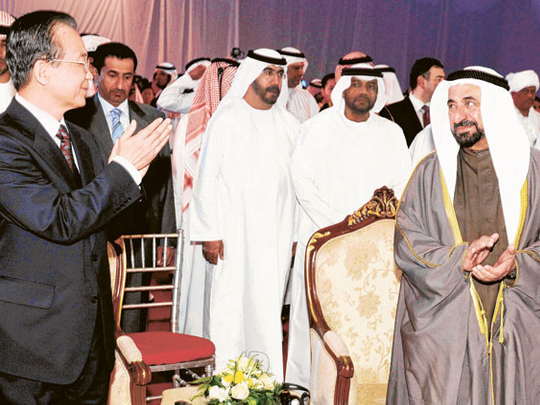
Sharjah: Chinese Premier Wen Jiabao called for the quick conclusion of talks on a free trade pact with the GCC during a visit to the UAE yesterday.
"Both sides need to show political will to sign the agreement as soon as possible," Wen told participants at the fourth edition of the Chinese-Arab business conference in Sharjah.
"The negotiations have been going on for seven and a half years, while business communities on both sides would like to see" an agreement concluded, he said.
"The launch of a free trade area will bring benefits to both sides," added the Chinese leader who is touring the Gulf amid fears that rising tensions over Iran's nuclear programme will disrupt world oil supplies.
The current Eurozone crisis means that China could become an alternative market for exports and investments from the Arab world, said Mohammad Bin Yousuf, director-general of the Arab Industrial Development and Mining Organisation.
By 2015, China's dependence on Arab oil will reach 70 per cent and by 2030 will hit 90 per cent, he noted.
Promising sectors for Chinese investments in the Arab world include petrochemicals, chemicals and fertilisers, steel and alum-inium, industrial services electric equipment, agricultural products, car manufacturing and infrastructure, said Bin Yousuf during a presentation on Chinese-Arab industrial investment opportunities.
Addressing needs
China needs to adequately address the Arab world's needs in the areas of developing human capital, manufacturing, technology transfer, international standardisation of commodities and diversifying investment portfolios, he added.
"Applying the principle of investment co-operation or a win-win approach will ensure investment and economic benefits for both sides," he said.
Sharjah's small and medium industrial businesses are a main starting point for Chinese investments in the industrial sector, said Hussain Mohammad Al Mahmoudi, director-general of the Sharjah Chamber of Commerce and Industry.
China and the Gulf Cooperation Council announced they were launching free trade talks in July 2004, and have since held five rounds of negotiations, according to China FTA (free trade agreement) Network. They have agreed on most issues concerning trade in goods, it said.
Seeking solutions
China and the Arab countries must immediately work on ways to resolve their trade disagreements within the framework of the Arab League, said Dr Mohammmad Al Twaijri, Assistant General Secretary for Economic Affairs at the Arab League.
They must also work on partnerships in peaceful uses for nuclear power including desalination and power generation, encouraging the tourism sector on both sides, and signing MoUs (memoranda of understanding) on infrastructure deals, he said.












